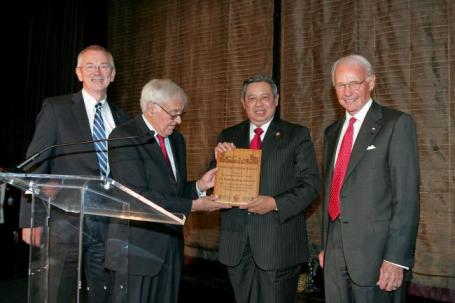Presiden Indonesia SBY: Menghadapi Tantangan Ekonomi dan Lingkungan Hari Ini dengan "Menghargai Alam"

Postingan blog saat ini baru tersedia dalam bahasa Inggris
WRI co-hosted a dinner last week to honor Indonesia’s President Susilo Bambang Yudhoyono for advancing sustainability, especially in the Coral Triangle. The event took place at the Mandarin Oriental Hotel in New York City, where more than 300 guests from government, business, and the non-profit sector gathered to recognize Indonesia’s president.
WRI’s president, Andrew Steer, opened the event by reminding guests that President Yudhoyono is a “different kind of leader.” Earlier in his career, Steer spent eight years in Indonesia, and he’s seen firsthand how the country has approached its economic and environmental challenges.
“We live in perilous times,” Steer said. “We need innovative thinking and we need out-of-the-box thinking. Today, we have a leader who is an out-of-the-box leader.” The key to sustainable growth, Dr. Steer explained, is to bring together the economy, the environment, and equity.
President Yudhoyono has been pursuing this approach—with impressive results. Over the past decade, Indonesia’s annual GDP has grown between 4 to 6 percent each year. Indonesia was the second-fastest growing economy in Asia this past year, trailing only China. According to McKinsey & Co., Indonesia is now the 15th-largest economy and could reach seventh in the world by 2030 , surpassing Germany and England along the way.
Valuing and Protecting Nature in Indonesia
Which brings us to last week’s dinner. WRI joined The Nature Conservancy and World Wildlife Fund in presenting President Yudhoyono with the “Valuing Nature Award.” In particular, the award recognized the president’s leadership in creating the Coral Triangle Initiative, an effort spanning six countries and seeking to protect millions of hectares of coral reefs.
The Coral Triangle Initiative is very important, as reefs are seriously threatened in the region. According to WRI’s analysis , more than 85 percent of coral reefs in the Triangle are already at risk due to human activities— ranging from overfishing to climate change. (Read our full report, “Reefs at Risk Revisited in the Coral Triangle.”)
That’s a problem because the Coral Triangle contains 75 percent of all known coral species. Moreover, it offers food, livelihoods, and business opportunities to millions of people. In total, the Coral Triangle’s reefs, mangroves, and associated habitats are valued at US $2.3 billion. Indonesia’s efforts to improve management of these areas will be vital to people and sea life.
President Yudhoyono has made progress in areas beyond reefs, too. He recently put in place a two-year moratorium on logging permits for Indonesia’s primary natural forest and peatland, an area covering an estimated 64 to 72 million hectares. As the president explained, imposing a forest moratorium may not be a popular decision, but it’s important in order to protect the country’s fragile ecosystems. President Yudhoyono is also working to make sure that Indonesia’s booming palm oil industry is pursued without decimating the country’s natural resources.
Indonesia has also been forward-looking when it comes to climate change. As the president noted, he believes that developed countries must lead on reducing emissions, but developing countries should also do their part. To that end, Indonesia was among the first developing countries to establish clear, national climate targets, with a goal of reducing greenhouse gas emissions by 26 percent below business as usual by 2020— 41 percent with international aid.
Of course, Indonesia continues to face real challenges: Its forests and reefs are under threat. Its rapid economic growth and surging middle class is putting increasing pressure on scarce natural resources. And social equity must be a priority.
The Post-2015 Development Agenda
Recognizing Yudhoyono’s innovative approach, UN Secretary General Ban Ki-moon recently named him to be a co-chair on the high-level panel for the post-2015 development agenda. As the Millennium Development Goals (MDGs) are set to expire in 2015, this panel, which held its first meeting at the UN General Assembly last week , will be instrumental in forging a new development pathway. While the MDGs have been successful in establishing a framework to accelerate developing countries’ social and economic progress, the next development goals must go even further. Importantly, they need to more fully integrate sustainability and equity to ensure that that they are suited to our emerging, global challenges.
The award dinner’s speakers—including Jeffrey Sachs, director of the Earth Institute at Columbia University—agreed that the appointment of President Yudhoyono will be beneficial in achieving these goals.
Working Toward a More Sustainable Future
These issues were the backdrop to an enjoyable evening that included speeches, singing, dancing, and even a fashion show featuring sustainably made clothing from some of Indonesia’s top designers. But, in the end, the message came back to how we can create a more sustainable world.
“Every leader in any country faces one and the same basic question: How do we bring progress to our people?” President Yudhoyono said. “From day one of my presidency, this has been my highest priority. For me, the past eight years of my presidency have been a constant process of learning and adaptation … The more I thought about it, the more I realized we needed a better, integrated approach to both the economy and the environment.”
We are hopeful that President Yudhoyono will continue to take a bold approach in charting a sustainable pathway for Indonesia. Furthermore, we hope that more world leaders will adopt this way of thinking, building a strong economies and protecting the environment.